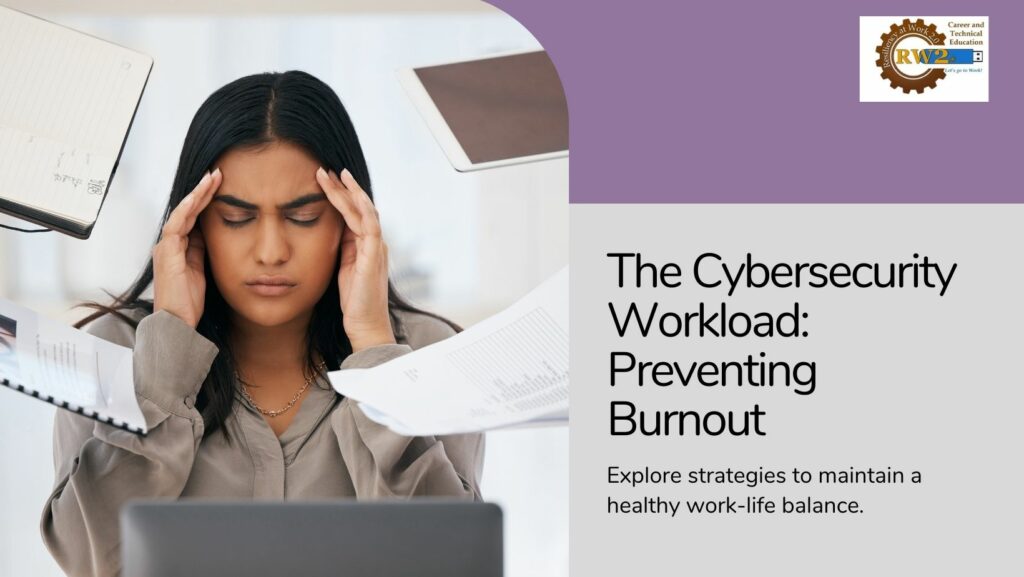
Today, anyone interested in a career in cybersecurity should pay close attention to what we have to say about managing workloads and preventing burnout.
As your cybersecurity career grows, it is important for individuals to learn how to handle the heavy responsibility that may come with the job. It’s easy for students to get stressed out and burned out when they have a lot of work to do and not enough time to finish their classes.
However, students can avoid burnout and improve their performance and happiness in the long run by using useful tips and techniques like setting sensible deadlines and splitting up work.
We talked to some of the Cybersecurity teachers at RW2 about this topic to learn more and get their thoughts and some tips on balancing life and work. So, grab a coffee, and let’s talk about some ways to help you keep your workload in check and avoid burnout.
Understanding the Cybersecurity Workload
Starting a job in cybersecurity can be like getting ready for a marathon where the course is always changing. Not only do you need to know how to do technical things like programming and network security, but you also need to know about the newest cyber threats and how to stop and deal with them effectively.
Cybersecurity students have to balance tough classes, a lot of reading, hands-on projects, and sometimes even jobs to get experience in the real world. It’s this intense mix of academic knowledge and real-world application that makes cybersecurity both fun and challenging.
The dedication doesn’t end with turning in assignments on time; it also means keeping up with changes in the field, which needs a proactive approach to learning and managing time.
Students can better prepare for the road ahead knowing early on how big and complicated the work is. It’s important to know that learning never ends in cybersecurity and that managing your work well is key to doing well in this exciting and gratifying field.
Setting Achievable Goals and Deadlines
Setting goals and dates that can be met is more than just a good idea in the crazy world of cybersecurity—it’s necessary to stay sane and make sure progress.
Start by breaking up your projects and coursework in cybersecurity into smaller jobs that you can handle. This not only makes the work seem less overwhelming, but it also gives you clear ways to see how far you’ve come.
For example, if you’re working on a project to improve network security, break it up into steps like study, implementation, testing, and evaluation.
Set reasonable due dates for each job based on your own obligations and schedule.
Remember that the goal is to push yourself without going too far. The flexible class dates at RW2 are very helpful in this case because they let you plan your study time around either day or evening classes.
Also, use computer tools or planners to keep track of the dates you need to do things. Setting alerts a few days before due dates can help you stay on track and avoid having to rush at the last minute.
This strategic method not only helps you handle your work better, but it also gives you a sense of accomplishment as you cross off completed tasks. This keeps you motivated and prevents burnout.
The Art of Prioritizing Your Tasks
Setting priorities for your tasks is like setting your GPS before a long trip; it helps you get through your work more quickly and make sure you reach your goals on time. Prioritize your tasks and projects into groups based on how important they are and how quickly they need to be done.
Right at the top of your list should be tasks that need to be done right away and are also very important. Most of the time, these are projects with tight deadlines or ones that have a big effect on your grade or learning.
Next, think about the jobs that are important but not necessary right now. These are the projects and study sessions that you need to keep working on over time. Setting aside specific times during the week to do these things can keep you from panicking at the last minute and help you make steady progress.
Don’t forget to figure out how much work each job needs. Getting a few smaller tasks done can sometimes clear your mind and give you more energy, which can make it easier to take on the bigger, more difficult tasks. This approach can also give you a quick sense of success, which can boost your motivation and get things done.
Keep in mind that being flexible is key. Cybersecurity is an area that is always changing, and new tasks may come up out of the blue. It’s very important to be able to adapt, even at the last minute. By learning how to set priorities, you’ll not only be able to handle your work better, but you’ll also feel more confident as you move forward in your studies and on the job.
Dividing the Workload: A Team Effort
Working together is not only helpful when studying; it’s necessary. When team members have different tasks to do, they use their different skills and points of view to make difficult jobs easier to handle.
This might look like setting up a meeting with your team to go over the project’s needs and due dates. It’s important to talk about everyone’s strengths and how their contributions can be best utilized. Each person takes a role based on their skills, making sure they are confident and know what their responsibilities are.
Next, make sure that everyone’s due dates are in line with the project’s schedule. To keep everyone up-to-date and on track, use tools for working together like group chats, sharing documents, and project management software.
It’s important to check in often so that problems can be dealt with quickly and plans can be changed as needed.
Remember that dividing the work is more than just giving out jobs. It also means making a safe space for learning where everyone can ask questions, share what they know, and give feedback.
Working together not only makes the process and the outcomes better, but it also builds community and a sense of shared success. Students in cybersecurity can get through the tough parts of their class more easily and learn more along the way if they work together.
An Insightful Interview with RW2 Cybersecurity Educators to Avoid Burnout
We reached out to some cybersecurity professionals about ways to manage cybersecurity work without getting burned out. We talked to an RW2 Cybersecurity Teacher, Michael Melendez, CISSP, and RW2 Board Member, Mark Anderson, Senior Information Security Manager, Compass Minerals.
Here’s what they had to say. We think you will find it helpful whether you are a student or professional.
Michael Melendez, CISSP
Instructor Cybersecurity, CISSP
Because cyber threats are always changing, how do you teach your students to stay up-to-date?
One of the foundational principles I introduce early to my students is “Change Is The Only Constant.” In other words, never stop learning. In my experience, success in Tech, and in particular Cybersecurity, requires a mindset of continuous improvement. The attacks that adversaries use will evolve. The systems and methods leveraged to protect assets also shift and fade. As Cybersecurity Practitioners, we must be agile and adapt to the changing landscape of the industry. There are many ways to stay educated and informed. Some strategies and resources include:
- Daily reading and listening via newspapers, blogs, podcasts, social media, and threat intelligence websites
- Subscribe to security bulletins and advisories from NIST, US-CERT, and vendors.
- Pursuing industry certifications from organizations such as CompTIA, ISC2, ISACA, EC-Council
- Online training from sources like LinkedIn Learning, Udemy, Antisyphon, and TryHackMe
- Going back to school at a local college or alternative education program like RW2
- Join local security group chapters like ISC2, OWASP, ISACA and attend meetings.
- Build and maintain your own virtual lab on-premise or in the cloud using open-source tools to practice
In the never-ending game of cat and mouse between adversaries and Cyber defenders, it is critical to stay abreast of the latest threats and trends. Adopting a proactive approach to learning and information sharing is key to keeping us safe in Cyberspace.
Mr. Mark Anderson
Senior Information Security Manager, RW2 Board Member
Because cybersecurity is a very stressful area with a lot at stake, what tips do you give your students on how to keep a healthy work-life balance? How do you include these ideas in your lessons?
Cybersecurity is all about managing risk. Every project, system, and process should have a clear line of sight to a purpose that directly correlates to your risk tolerance. Comprehending this brings the realization that you will never have the resources and time to ever be “done,” so always do the best you can with what you have to work with. Have fun and embrace the challenges and complexity of a rapidly evolving discipline. As in life, you learn as you live and do better as you grow in understanding. In game theory, you can never actually lose as long as the game persists and you remain engaged. So don’t ever quit, and always embrace continuous improvement.
On the softer side of all this, I make it a point to keep things light and not take myself too seriously (art of possibility rule #6). This is not to trivialize the mission, but to allow the thought process of idea generation and creativity to remain unbridled and free-flowing. My final point would be to stress the importance of humility and continuing to be coachable. Cybersecurity is the collective mission of many versus the solo efforts of one. This is not to dissuade the pursuit of individual excellence, but to always solicit and embrace the support of the team. In the space of cybersecurity, it is the unified efforts of many that create and maintain a secure environment. I will conclude this thought with a quote from Reid Hoffman:
“No matter how brilliant your mind or strategy, if you’re playing a solo game, you’ll always lose out to a team.”
Optimizing Learning and Flexibility with RW2’s Cybersecurity Online Classes
One great thing about RW2’s Cybersecurity school is that it is very flexible and is responsive to the needs of each student. Students can schedule their classes around their personal and work obligations because they are held just three days a week with morning or evening options.
Because students can finish the program in just 24 weeks,including soft skills and job search, their pathway to an entry-level cybersecurity or related opportunity is accelerated. RW2’s program also prepares students to sit for CompTIA’s Security+ exam.
RW2’s educational structure not only makes learning more effective, but it also gives students the tools they need to keep a healthy balance between work, school, and personal life. This is also important to keep students interested and motivated throughout their educational journey. Sign up now at RW2 to start your path to a rewarding job in cybersecurity.




Ny weekly This is really interesting, You’re a very skilled blogger. I’ve joined your feed and look forward to seeking more of your magnificent post. Also, I’ve shared your site in my social networks!
I do agree with all the ideas you have introduced on your post They are very convincing and will definitely work Still the posts are very short for newbies May just you please prolong them a little from subsequent time Thank you for the post
Thank you for your thoughtful feedback! I’m glad to hear that you found the ideas convincing. I appreciate your suggestion about lengthening the posts for newbies—I’ll definitely take that into account for future articles. Our goal is to provide valuable insights while ensuring everyone can follow along easily. If there are specific topics you’d like to see explored in more detail, feel free to share! Thanks again for your engagement!
Family Dollar I just like the helpful information you provide in your articles
Your article helped me a lot, is there any more related content? Thanks!